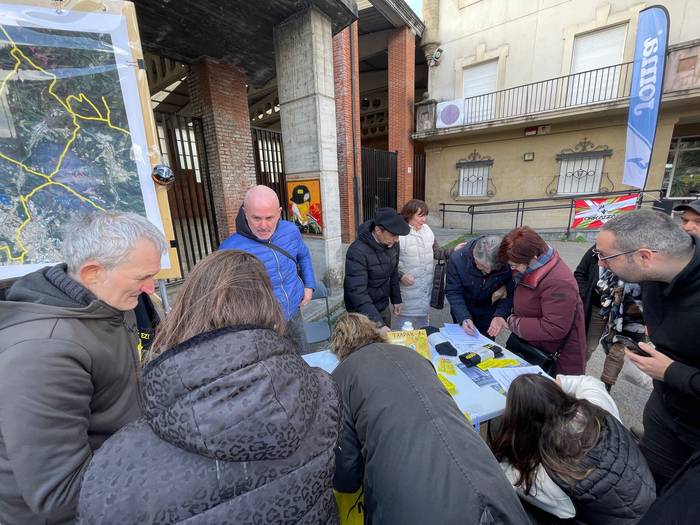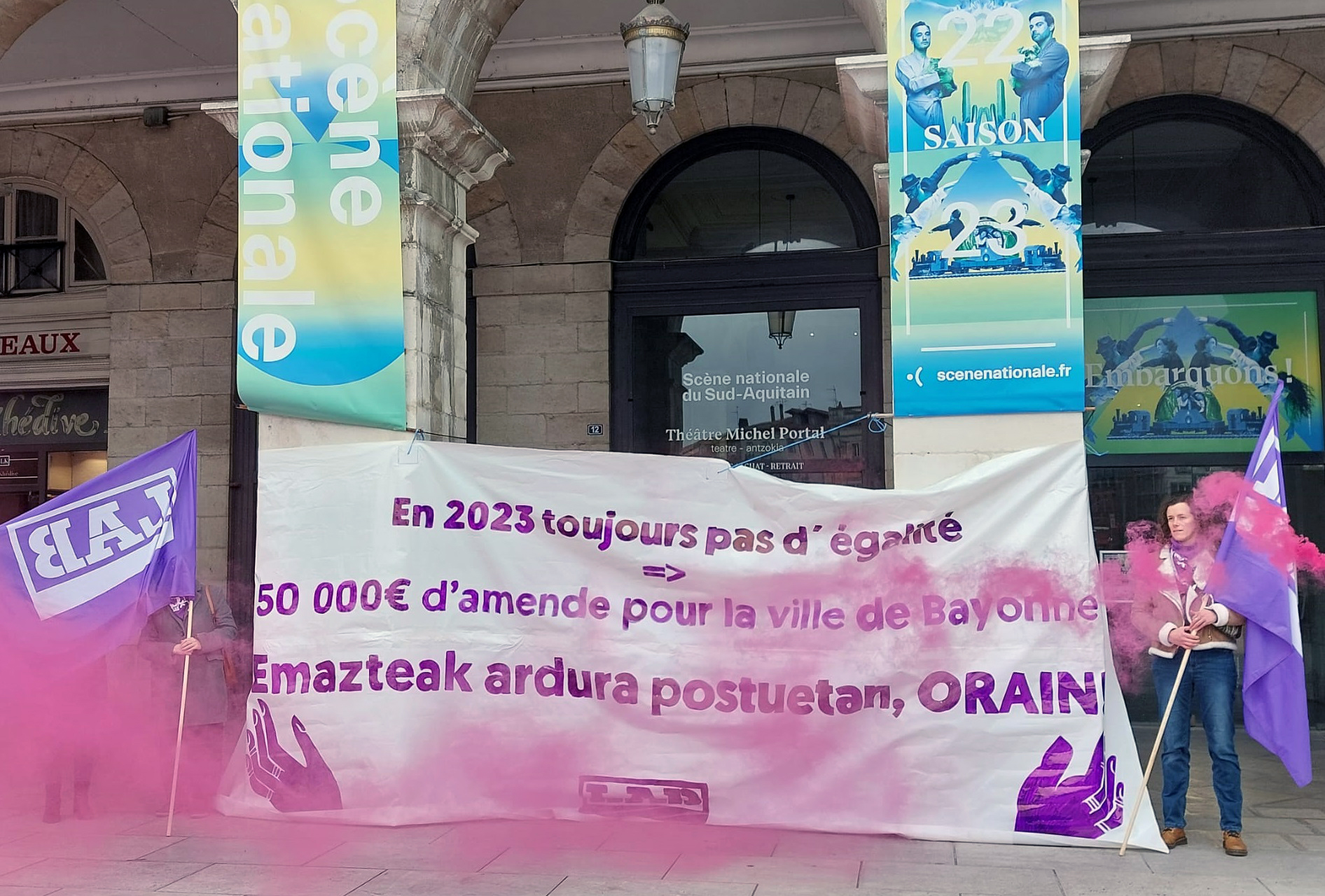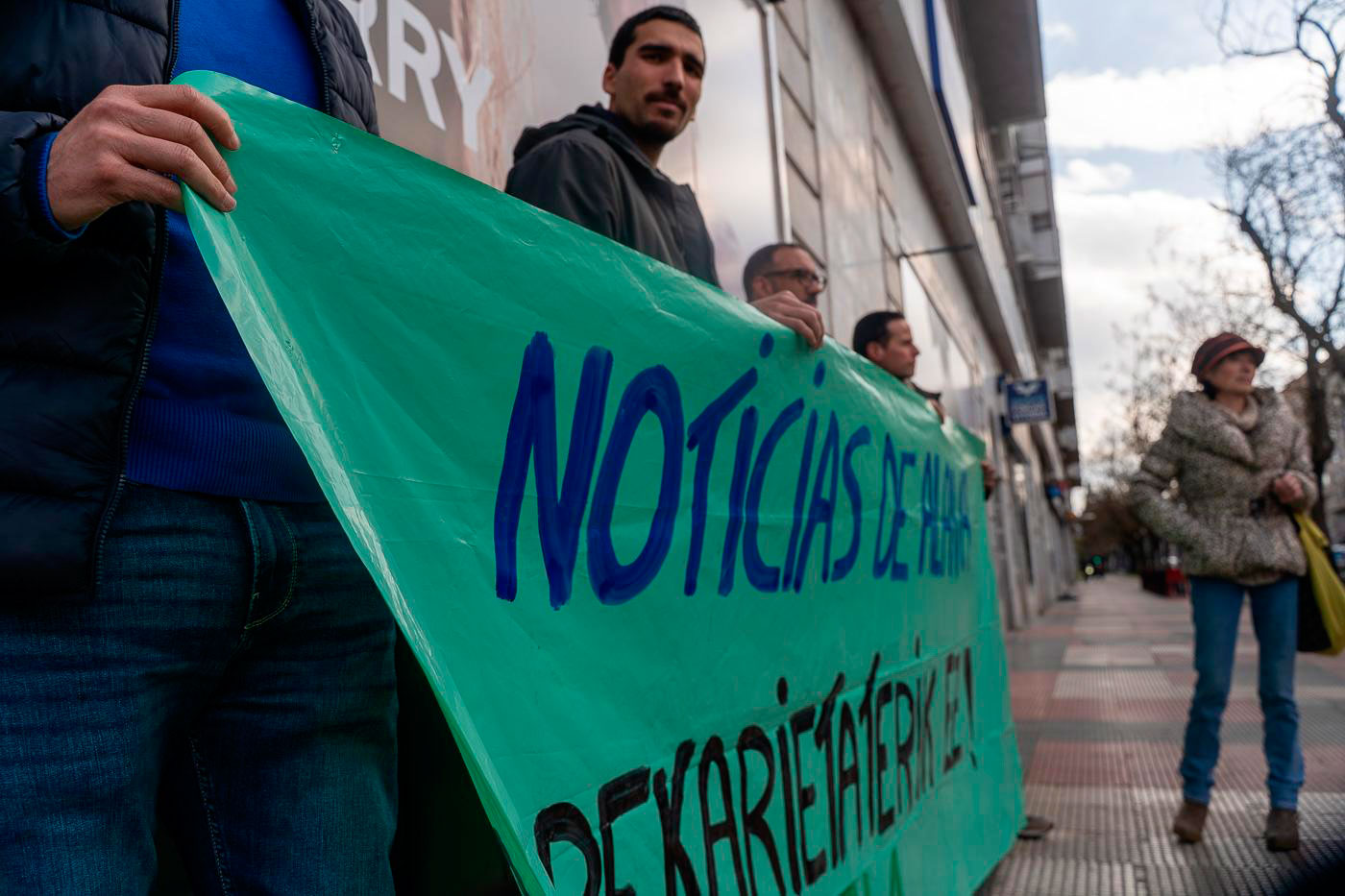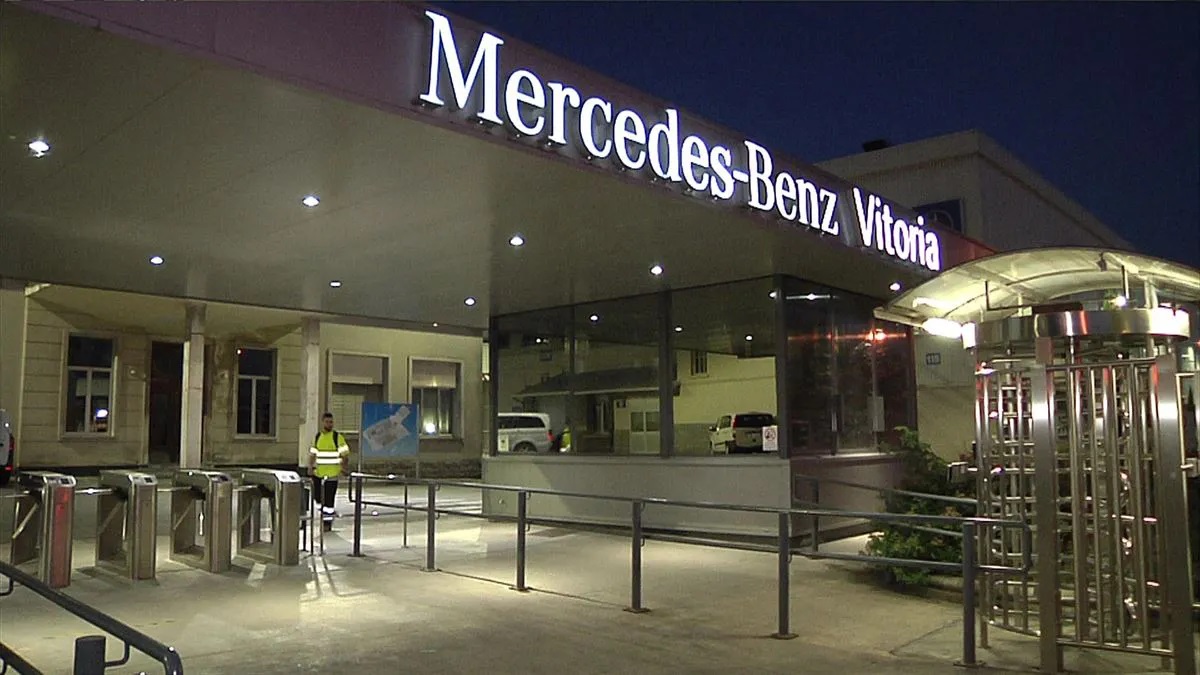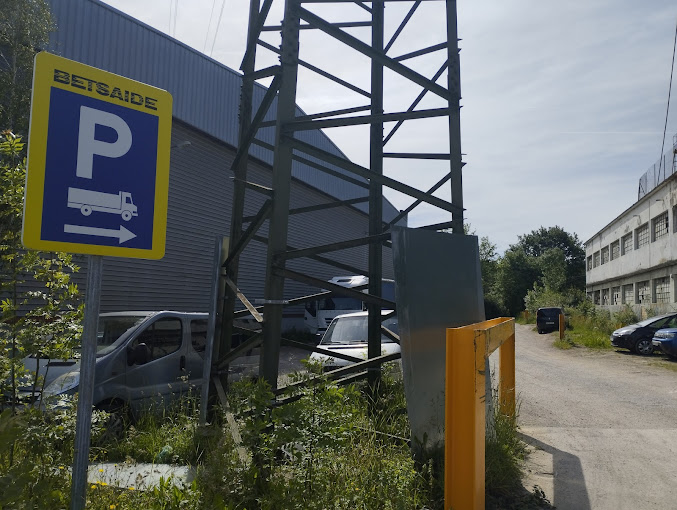We will overcome the Basque political blockade
- Analysing the poor social and economic policies that have been left behind, we want to assert the need for a Basque decline in the change that the Spanish State has recently launched, also overcoming the current situation of blockade in Euskal Herria.

The new government is in Spain after the simple majority achieved eight weeks ago by the PSOE and UPyD in the Congress of Deputies. This closes the lost decade of the crisis, with a leftist programmatic pact and a plurinational accumulation of parties, with the order of making democratizing policies after five years of political blockade. We will analyse the erroneous policies that have been left behind, emphasising the need for a Basque decline in the change recently undertaken by Spain.
In search of the lost decade
Pp and PNV decided to deepen the neoliberal path when the crisis broke out. The crisis in 2007 has caused serious job losses in the last decade, particularly in the construction, industry and trade sectors. There were alternatives, although we didn't succeed in it: making expansive anti-cyclical social policies in the short term, while in the long term, structural transformation was being driven. Samir Amine said that in the crisis of capitalism there were and are necessary new ways out of capitalism and steps towards socialism.
But no. The Basque and Spanish leaders decided to go down the road of deepening capitalism, making hard adjustment policies until 2014. With the reforms to worsen the conditions of workers and the reduction of social policies, the governments of Spain and the Basque Country made policies in favour of big business and banks. The troika halted austerity with a quantitative easing monetary policy to neutralize the rise of parties and coalitions such as Syriza, the Five Star Movement, the Bloko, Podemos and Sinn Fein, in countries called GIPSI. Thus, the then director of the European Central Bank, Mario Draghi, wanted to soften the political crisis that was developing in January 2015.
Meanwhile, both Rajoy and Urkullu, Rementeria and the company decided not to replace public employees’ retirements and increase the temporality and outsourcing of the workforce. They facilitated redundancies, supported financial institutions and did nothing against the toughest social consequences of the housing bubble. At the time when they were essential, Income Guarantee Income (IGR) and other social policies such as health, education, collective care… were also constantly reduced. They did little in the industrial and economic sphere that had the key to the solution, while reaffirming their commitment to internationalization, deindustrialization and new deficient activities.
Internationalisation and deindustrialisation
On the one hand, internationalization, i.e. the decapitalization of Basque companies, has been the main strategy of Arantxa Tapia and SPRI, rather than attempting to revive domestic demand. Both the PNV and pp, supporting large Basque companies both in the search for international markets and in the search for international capital, sought to balance the external balance, especially due to the drop in imports, with the support of the reduction in oil prices. Instead of innovations and investments to boost real and solid exports, the Basque and Spanish authorities have developed a policy to combat local investment and occupation.
Deindustrialisation has, moreover, been the main indifference of the authorities, a chaotic trend that, beyond the last decade, has been fixed since the last quarter of the last century. Rather than making policies for viable industrial activities in times of crisis, i.e., rather than forcing capitalists to work through public investments or capitalization, the loopholes of the PNV governments have prevailed. They have put the interests of global capitalists above the needs of local employees, customers and suppliers, putting the nationalist trend towards economic liberalisation first.
It remains the option of PNV and pp. They are in favour of reaffirming the erroneous “cement tourism” model based on the devaluation of workers’ wages and the productivity of companies and on the economic and energy deficit with the outside, and have deepened the wrong road shown in the last two or three years, both in Madrid and Bizkaia
In the meantime, they are betting on new actions with low added value to replace lost industrial occupations. Tourism and the economy of ephemeral macro-events have driven a business model with low wages and benefits. At the same time, the private procurement of (sub-)services has become a public policy model, assuming the criteria established in the 1980s by the creators of neoliberalism (Thatcher and Reagan). Finally, the constructors have been the engine of this exhausted model, through the speculative multiplication of large public infrastructure and private housing. It remains the option of PNV and pp. They are in favour of reaffirming the erroneous “cement tourism” model, which is based on the devaluation of workers’ wages and the productivity of companies and on the economic and energy deficit with the outside world, and have deepened the wrong road shown in the last two or three years, both in Madrid and in Bizkaia.
New Spanish policy
While the new policy of the Spanish Government is slowly developing, the analysis of the programmatic agreement for the PSOE-UP legislature is necessary. The improvement of the rights of working people, the strengthening of ecological, social and feminist policies and the tax reform to obtain new resources are the main axes of this agreement, the limits of which are noticeable to the extent that it has remained far from the demands of the United Nations Podemos. Among the steps that will be taken in the field of labour to protect workers slightly against redundancies, to re-establish the ultra active nature of contracts, to strengthen labour inspection, to raise the minimum wage, to reduce the forced labour bias of women and to dignify domestic workers are international difficulties and the pulse with local social partners.
The government has announced many things, some of them aesthetic, which have very little real effect. In the meantime, measures can be taken directly if the will is manifested. However, it is being said that they will do so in the future in order not to pull the rope with the employers: it is a golden time to apply the SREs and other similar measures. In fact, the main challenge will be the labour reform that will be carried out in a fragmentary way, or the drafting of the new Workers’ Statute. How will they do it? On one side? Just with some employers and unions? Or by discussing with more unions and employers? On the other hand, in order for labour reform to be a success, in the case of unfair dismissal, the key is to leave the return to work in the hands of the worker. Otherwise, the problem will be of little money.
The second pillar of the new government’s promise is to strengthen social policies beyond the labour market. Policies will be established to improve public education and health systems, programs to combat dependency and poverty in old age and, first, and then for all, the Minimum Vital Income (similar to the Basque IGR). Along with this, the new environmental, feminist and sectoral policies complete the economic programme, which will bring legislative changes and new spending and investment measures.
Faced with this fiscal programme of the new Spanish Government, will the Basque institutions themselves continue along the same lines? Or will the Basque oasis remain a chimera for the rich cosmopolitan? The answer is in our hands.
The team of the Secretary of State for Social Rights, Nacho Álvarez, will be in charge of planning and implementing progress in this area, provided that the Government receives new resources through tax reforms. GAFAM (Google, Apple, Facebook, Amazon, Microsoft) has recently approved the Tobin tax for technology and financial companies, and most importantly is the forecast of increasing corporate tax to large and medium-sized entrepreneurs, setting a floor of 15% (18% for financial institutions). The government also wants to raise IRPF to taxpayers who charge more than EUR 130,000, the Basque Executive has reported. Faced with this fiscal programme, will the Basque institutions themselves continue along the same lines? Or will the Basque oasis remain a chimera for the rich cosmopolitan? The answer is in our hands.
The Basque blockade continues
Since after the 2019 Foral Elections the need to rethink the process of change in Navarre was raised, the primacy of the PSOE to make leftist politics has become widespread, also in Euskal Herria. The “peaceful change” of the table led by Uxue Barkos is the reason for the defeat for some, as the non-materialization of so many chapters (pdf) of the programme agreed in 2015 meant the demobilization of many citizens. In any case, the Navarre forces have been able to face the change that has begun, putting the PSN in the equation and lehendakari to the socialist María Txibite.
At the same time, nothing has moved in the governments of Bizkaia, Gipuzkoa and Álava. The PNV and the PSE-EE, competitors and allies at different times, continue to rule together, evidencing the impotence of the political and social left. Unlike the Members, they do not have a majority in the Basque Parliament, and we believe that in the elections on 5 April the two historical forces of the regime will demonstrate their inability to get out of their weakness. Beyond media noise, we must not forget that the largest Basque institution has been blocked for years. Initially they ruled with pp, but it was Spanish politics that broke that alliance and weakened both the executive and the Urkullu legislature.
Meanwhile, as the economic and social situation worsens, the need to find directions also organized in Euskal Herria, from the roundabouts occupied by the Yacarés de Lapurdi to the streets of Gipuzkoa and Bizkaia. The new model that is being promoted in towns and neighbourhoods must also be translated into institutions. It calls for the accumulation of left-wing forces, for example, the candidate of Elkarrekin Podemos, Miren Gorrotxategi, while EH Bildu and PSE run the risk of looking at the PNV to favor partial consensus managers on national or social lines.
The increase in social and trade union conflict has focused in recent months, in particular, on the strike of 30 October. But it's not enough. We have to make the leap from the partial fights of long years to a radical global transformative movement with the aim of sending home the bad nationalist managers. That is the main opportunity to develop new environmental, feminist and socialist policies.
Europar Kontseiluak onartu du Ursula Von der Leyenek gastu militarrean proposatu duen 800.000 milioi euroko gastuarekin aurrera egitea. Horretarako bi arrazoi nagusi argudiatu ditu: Errusiari aurrea egitea eta Europar Batasunak aurrerantzean bere burua AEBen babes militarrik... [+]
Laudion, Aiaran eta Okondon izango du eragina energia azpiegiturak eta plataformaren aburuz, proiektuak eta ingurumen-inpaktuaren azterketak gabezia garrantzitsuak dituzte.
Nahiz eta Nazio Batuen Erakundeak (NBE) 1977an nazioarteko egun bat bezala deklaratu zuen eta haren jatorriaren hipotesi ezberdinak diren, Martxoaren 8aren iturria berez emazte langileen mugimenduari lotua da.
Lan baldintzen "prekarietatea" salatzeko kontzentrazioa egin zuten asteartean egunkariaren egoitzaren aurrean. Abenduaren 2tik sindaura greban daude langileak eta mobizlizazioak "areagotzea" erabaki dute orain.
Gasteizko Eraman kooperatibak banaketa “era jasangarri eta etikoan” eginez bertako komertzioa bultzatzeko helburua du bere sorreratik, Arabako hiriburuan eta hango bizilagunengan pentsatuta. Hainbat ekimenetan parte hartzen du, horien artean ikasturte honetan egiten... [+]
Langileek salatu dute zuzendaritzak ez diela lan baldintzen gaiari heldu nahi izan eta enpresak nahiago izan duela Gaztea Sariak ekitaldia bertan behera utzi, “horrek sortutako albo-kalte ekonomiko eta sozial guztiekin”, arazoari irtenbidea eman baino.
Datorren astelehenean egingo dute espedientearen kontsulta epeko bigarren bilera.
Sustatun agertutako salaketa, LaLiga futbol erakunde espainiarraren eta Movistar/Telefonicaren arteko tratuek euskarazko zerbitzuak kaltetzen dituztela Interneten (kasu hartan Egunean Behin jokoan irudiak desagertzea zen kontua), hedatu egin da. Tokikom-eko euskarazko tokiko... [+]
Ursula Von der Leyen Europako Batzordeko presidenteak Europa berrarmatu plana aurkeztu du, kontinentea "erresilientea eta segurua" bihurtzea xede duena. Bost zati ditu planak, eta estatu kideek 150.000 milioi euro jasoko dituzte mailegutan. Arau fiskalak moldatuko... [+]
2021etik 2025era isuriak %15ean murriztu behar zituen industriak. Ursula Von Der Leyenek automobilgintzaren sektorearen eskutik ekintza plan bat aurkeztuko du martxoaren 5ean. Oraindik erabakia hartua ez badago ere, Europar Batasunak sektorearen eskaerak onartuko dituela diote... [+]
Betsaide enpresan gertatu da, 08:00ak aldera. Urtea hasi denetik gutxienez bederatzi behargin hil dira.
Agintari gutxik aitortzen dute publikoki, disimulurik eta konplexurik gabe, multinazional kutsatzaileen alde daudela. Nahiago izaten dute enpresa horien aurpegi berdea babestu, “planetaren alde” lan egiten ari direla harro azpimarratu, eta kutsadura eta marroiz... [+]
Mendizale batek asteburuan ikusi du animalia Lapurdiko Azkaine herrian, eta otsoa dela baieztatu du Pirinio Atlantikoetako Prefeturak. ELB lurraldean "harraparien presentziaren kontra" agertu da.
2024ko laneko ezbeharren txostena aurkeztu dute LAB • ESK • STEILAS • EHNE-etxalde eta HIRU sindikatuek aurtengo otsailean. Emaitza larriak bildu dituzte: geroz eta behargin gehiago hiltzen dira haien lanpostuetan.
Arma nuklearren produkzioarekin, mantentze lanekin eta modernizazioarekin loturak dituzten hainbat enpresa aztertu dituzte, eta horien artean agertzen dira BBVA, Santander bankua eta SEPI.









